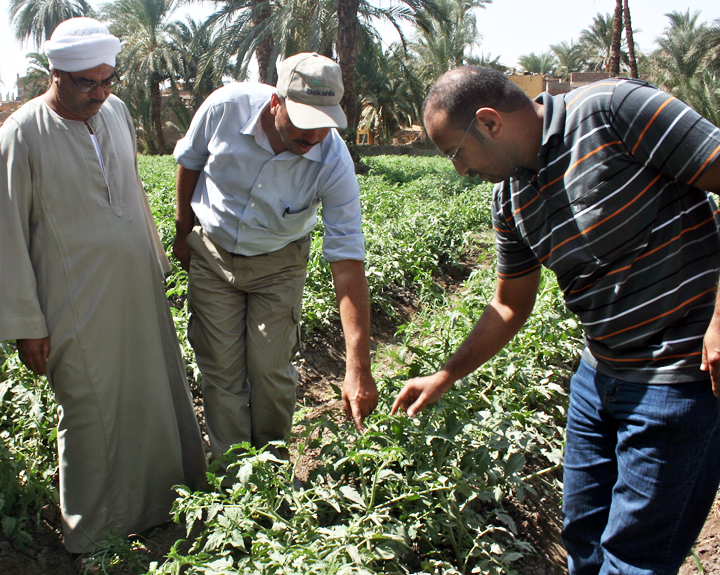

MDG-F backs a revolution in Egyptian farming

When the Arab Spring blew over Egypt in early 2011, most investors predicted chaos and fled, pushing already massive unemployment even higher and plunging the economy into profound uncertainty. But Mohamed Embarak, a farmer in Egypt’s depressed south, saw only opportunity.
With four others, Embarak invested his life savings and created “Goodies for Agricultural Investment”, the first agri-business company in Upper Egypt owned and run by small farmers.
“Many people think that Egypt’s upheaval means instability. To me these are the best times to root in new practices, standards and working culture,” says Embarak. Advised by a team of agronomists and experts who are part of an MDG-F-funded UN programme, “Goodies” will help other small farmers collectively grow quality horticultural products and connect them directly to markets.
“By the time the country restores its balance, Goodies will be ready to work side by side with large producers and private sector investors who at the moment don’t dare get involved in this region, particularly since they don’t know the culture or the people,” says Embarak. “But we do, and this is our unique advantage.”
Embarak and his partners are among hundreds of farmers being helped by the joint UN programme, which is aimed at encouraging an entrepreneurial spirit and improving livelihoods in Upper Egypt, a region that contains only a quarter of Egypt’s population but two thirds of its extremely poor and 95% of its poorest villages.
The programme, “Pro-poor Horticulture Value Chains in Upper Egypt (SALASEL)” incorporates the Arabic word for “chains” – and is based on improving small farmers’ position in the chain of value-adding activities that comprise food production. It helps farmers match their production to market demands, boost their productivity and profitability by reducing food loss after harvest, and improve their positions in export and domestic markets by helping them develop direct links with large agri-businesses, food processing firms and wholesalers.
“To lift small-scale farmers out of poverty, we desperately need to break the long chain of middlemen trading that has for so long eaten up the small farmers’ potential profits; we need to provide the farmers with direct access to the big markets,” says Embarak.
The programme offers farmers strategic guidance to match their production plans with existing demand, a market-driven technique known as “contract farming”. “Goodies” plans to provide supplies such as seeds, pesticides and fertilizers to ease the financial burden on farmers at the early stages of cultivation. Advisors will also help farmers market their produce to ensure that they get fair prices for their hard work.
“Relating marketing activities to technical training is a very effective policy. Farmers are hard workers, yet they are mostly used to traditional farming techniques. Contract farming means the prospect of securing a higher profit margin ahead of plantation -- this is a very strong incentive for them to adopt new, more advanced techniques and practices,” said Hany Nashed, marketing officer of the SALASEL programme’s Luxor office, which has six full-time agronomists.
The SALASEL programme is also supporting a post-harvest center in Qena governate, one of the six where SALASEL operates, to help Goodies’ farmers cut back on waste. Although Egypt is the world’s fifth-largest tomato producer, its exports have plummeted by more than 90% over the past 15 years, primarily due to massive losses in the crop that occur at post-harvest and processing levels.
At the post-harvest center, farmers are introduced to new techniques to preserve their product’s high quality through appropriate treatment and packaging, as well as training on farming economics with a focus on how to manage and minimize the costs of production.
“Finally I can fight back nasty crop pests at low costs. I used to buy the most expensive pesticide thinking it is the most effective. I was wrong." said Hajj Aly, a 70-years old farmer who recently attended a week-long workshop organized by SALASEL. Through the workshop, Aly will be able to sell his produce at a German-run mega-market in Egypt.
SALASEL, which also aims to strengthen women’s roles in the production process, is part of the MDG-Fund’s work to improve life for the world’s most disadvantaged people and help countries like Egypt to achieve the anti-poverty Millennium Development Goals.
“Thanks to the winds of change of the January 25 revolution, the snow ball is rolling even faster than we planned or thought,“ said Wael Rafea, manager of the SALASEL Joint Programme, which is a collaboration between the Egyptian government and four UN agencies -- ILO, UNDP, UN Women and UNIDO.
“One successful model can gradually induce change, but what we have at hand is an active and eager community. More than one business model are already evolving and taking shape, and their impact, I hope, will be deeper and wider than we can ever imagine.”
Goodies founder Mohamed Embarak says he is confident that the SALASEL programme, and the work of Goodies, will bring new activity, industries and trade to Upper Egypt, and provide a better future for his three young children. “This simply means that my children will have better chances and more choices of employment when they grow up…To me, this venture is more than just an investment. It is about seeding hope for my family, friends and a whole community of small farmers in Upper Egypt.”